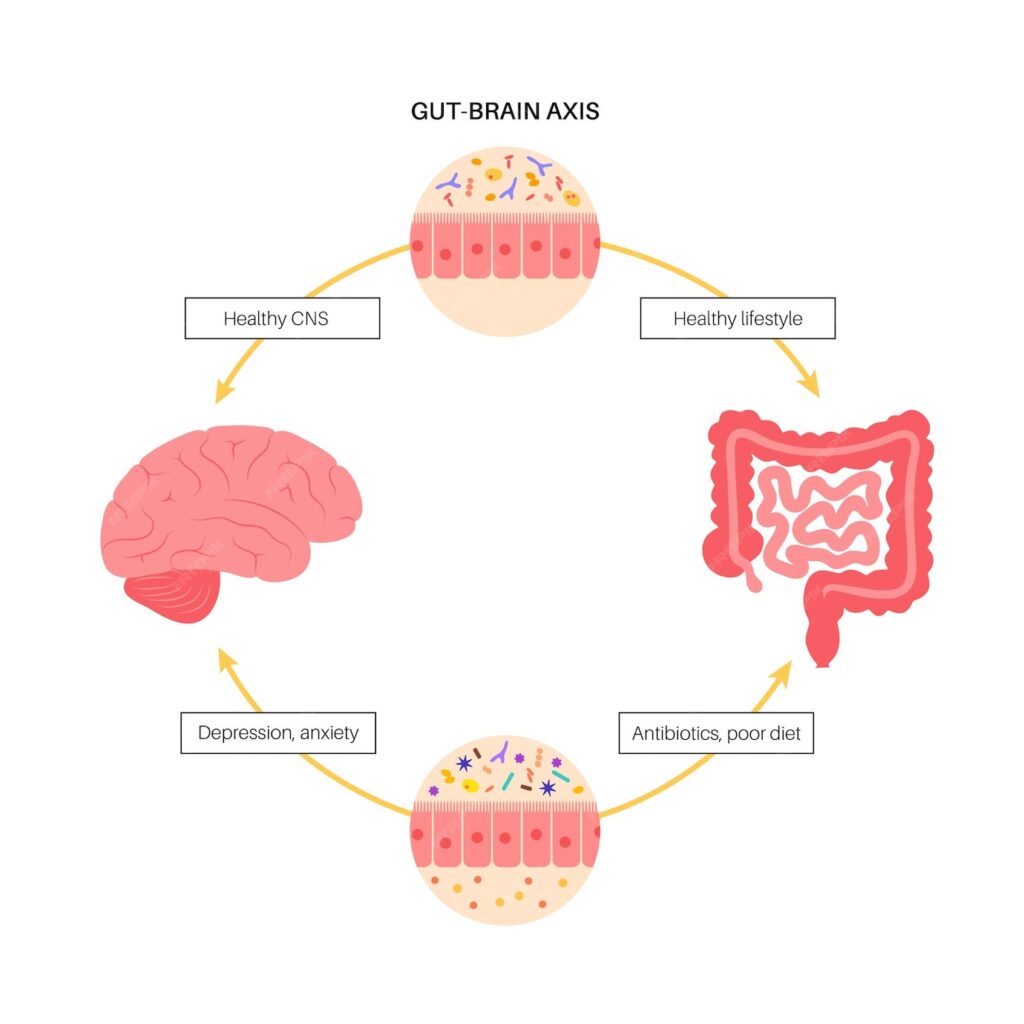5 Proven Ways to Supercharge Your Gut-Brain Connection
You’ve probably heard the phrase ‘trust your gut.’ It turns out this isn’t just a saying; it’s rooted in science. The gut is often called our second brain because of its complex interaction with the brain and its significant role in our overall health. But why is this connection so important? And how does the gut influence not just digestion but also immunity and even mental health?
Decoding the Gut-Brain Connection
Have you been in a situation where you’ve been preparing for an important meeting or presentation for weeks, rehearsed your points, organized everything, and felt ready until the morning of the event? Suddenly, a knot tightens in your stomach. You feel queasy, your heart starts racing, and you might even want to use the restroom urgently.
Does it sound familiar?
This isn’t just nerves playing tricks on you; it’s your gut reacting to the signals from your brain. Your stress, anxiety, and pressure don’t stay confined to your mind; they ripple down to your digestive system. It’s not uncommon to feel like your stomach is flipping when under stress or even lose your appetite altogether.
Now, imagine this happening regularly. Whether it’s a big presentation, a job interview, or even just the stress of daily life, the gut feels every emotion you experience. Many people ignore these signs, chalking them up to temporary stress, but over time, that consistent tension can lead to gut issues like bloating, IBS, and indigestion. It’s the body’s way of saying, “Hey, something isn’t right.”
This gut-brain connection is more than just a passing sensation; it’s a powerful dialogue between two vital systems in your body. And once you start paying attention to it, you can take control of your mental and physical health.

The Gut is the Body’s Control Center
The gut is home to trillions of microorganisms, collectively known as the gut microbiome. This ecosystem plays a crucial role in regulating not only digestion but also the immune system, metabolism, hormones and even the nervous system.The gut communicates with the brain through the gut-brain axis, a dynamic, two-way communication channel that involves chemical and neural signals. This connection is so powerful that the gut’s condition can influence brain function, mood, and even behavior.
When the gut is in balance, these microorganisms support our immune system by helping to regulate inflammation, protect the gut lining, and produce vital nutrients. However, when the gut microbiome becomes disrupted, also called dysbiosis of the gut, an imbalance in the gut microbiome is characterized by a decrease in beneficial bacteria and an overgrowth of harmful microorganisms. It can be through poor diet, stress, or illness, which can lead to various health issues, including digestive disorders, inflammation, and even mental health problems.
One groundbreaking study published in Current Research in Behavioral Sciences, found that when individuals experience stress, their gut bacteria composition changes, leading to inflammation, digestive issues, and weakened immunity. This interaction between the brain and the gut isn’t a one-way street; it’s a dialogue. Your gut can influence your mental state just as much as your brain influences your digestion.
Gut-Brain Connection: The Role of Stress
Now, let’s talk about how stress throws this delicate system out of balance. The nervous system operates in two primary modes: sympathetic (fight or flight) and parasympathetic (rest and digest). When you are stressed, your sympathetic nervous system takes over, diverting energy away from non-essential functions like digestion and immune regulation to deal with immediate threats. This is why stress often leads to poor digestion, bloating, and other gut-related issues.
On the other hand, the parasympathetic nervous system kicks in when you’re relaxed. This is your body’s mode, where digestion can happen smoothly, the microbiota of the gut can thrive, and the immune system can function optimally. Spending more time in this relaxed state is paramount to promoting gut health.
Short bursts of cortisol can be helpful, giving you a burst of energy or focus when you need it most. But what happens when stress becomes chronic?

Cortisol and the Microbiome: Long-Term Effects
Prolonged exposure to cortisol does more than affect stress levels; it actively hampers the health of your gut microbiome. Chronic stress weakens the integrity of the gut lining, leading to increased intestinal permeability, often called leaky gut. This allows harmful toxins and bacteria to enter the bloodstream, triggering inflammation and compromising the immune system.
Imagine your gut lining as a delicate fishnet with a fine mesh. In ideal conditions, this mesh facilitates the smooth exchange of nutrients, enzymes, and hormones while keeping harmful bacteria and toxins at bay. However, when poor food and lifestyle choices become a pattern, the gut struggles to process these unhealthy inputs. Over time, the spaces in the mesh widen, weakening the barrier.
It results in a compromised gut lining. Larger, undigested food particles and proteins can now pass through the gut barrier and enter your bloodstream. Since your body doesn’t recognize these substances, it perceives them as foreign invaders, triggering an immune response. When your immune system begins attacking its own tissues, it opens the door to autoimmune issues.
A leaky gut left unchecked can become the breeding ground for serious autoimmune conditions like inflammatory bowel disease (IBD), multiple sclerosis, systemic lupus erythematosus (SLE) and so on. Taking care of your gut is essential to avoid this cascade of health problems.
Moreover, stress alters the composition of the microbiota itself, reducing the diversity of beneficial bacteria and allowing harmful pathogens to flourish. This imbalance has far-reaching effects, including an increased risk for autoimmune disorders, inflammatory bowel disease, and even neurological conditions.
Immune Network have published a journal that shows the brain is also affected when the gut barrier is weakened. Disruptions in microbial communities have been linked to several neurological disorders, including anxiety, depression, and even neurodegenerative diseases like Parkinson’s. Maintaining a healthy gut microbiome isn’t just about digestion; it’s also about preserving mental health.
Strategies to Strengthen Your Gut-Brain Connection
Let’s find out how you can support your gut and brain health? The following routine will help you manage stress, improve digestion, and sleep better by engaging the parasympathetic nervous system:
- Nourish Your Gut with Wholesome Foods: Incorporate fiber-rich fruits, vegetables, and whole grains to feed beneficial gut bacteria. Fermented foods like yogurt, sauerkraut, and kimchi are excellent for boosting microbiome diversity.
- Manage Stress: Chronic stress is a major culprit in gut imbalances. Practice mindfulness, yoga, and other stress-relieving activities to promote parasympathetic activation. You can incorporate yoga asanas like:
- Child’s Pose (Balasana) to promote relaxation.
- Cat-Cow Stretch (Marjaryasana-Bitilasana) to ease tension in the spine.
- Downward Dog (Adho Mukha Svanasana) to rejuvenate and reduce anxiety.
- Bridge Pose (Setu Bandhasana) to open the chest and relieve stress.

- Stay Active: Regular exercise not only reduces stress but also improves circulation and supports healthy digestion, ensuring nutrients reach every cell in your body.
- Prioritize Sleep: Poor sleep can disrupt both the gut microbiome and brain function. Aim for 7-9 hours of quality sleep each night to support overall health.
- Deep Breathing Routine: One of the quickest ways to shift from the stress-induced sympathetic mode to the calming parasympathetic mode is by training your breath. You’ll notice an enhanced sense of calm, better focus, and a more grounded feeling throughout the day. By consistently practicing the following morning and night deep breathing routines, you will cultivate not only better physical health but also improved emotional resilience.
Morning Deep Breathing Routine
This will help to energize the body, reduce stress, and activate the parasympathetic nervous system to start the day with focus and balance. Start by doing it for five minutes in the beginning and then slowly you can increase the duration.
- Wake-Up Breath : This technique will wake your system gently, floods the body with oxygen, and helps clear mental fog.
- Sit up straight on your bed or a chair, feet flat on the ground.
- Inhale deeply through your nose for a count of four, expanding your belly (diaphragmatic breathing).
- Hold for two counts.
- Exhale slowly through your mouth for a count of six.
- Repeat for three minutes.
- 4-7-8 Breathing: It will balance oxygen and carbon dioxide levels, reduce stress, and bring a calming focus to the day.
- Sit in a comfortable position with your back straight.
- Inhale deeply through your nose for four counts.
- Hold your breath for seven counts.
- Exhale completely through your mouth for eight counts, making a soft whoosh sound.
- Repeat for four to five cycles, gradually increasing the duration over time.
- Sunshine Breath: This exercise will energize the body and mind, boost mood, and help set a positive tone for the day.
- Sit or stand, facing a source of natural light, if possible.
- Inhale deeply through your nose for five counts, lifting your arms as if reaching for the sun.
- Hold for two counts.
- Exhale slowly through your mouth for six counts, lowering your arms to your sides.
- Repeat for three minutes, visualizing energy flowing through your body.
- Box Breathing: It enhances focus and mental clarity, reduces anxiety, and centers thoughts.
- Sit cross-legged or on a chair with your feet grounded.
- Inhale for four counts.
- Hold your breath for four counts.
- Exhale for four counts.
- Hold the exhale for four counts.
- Repeat for three minutes.
Night Deep Breathing Routine
Deep breathing routing at night can calm the mind, reduce stress, lower cortisol levels, and prepare the body for restful sleep. A few breathing exercises you can try could be:
- Diaphragmatic Breathing: This technique activates the parasympathetic nervous system, promotes relaxation, and soothes the gut.
- Lie on your back in bed or on a yoga mat, knees bent, feet flat, or legs extended.
- Place one hand on your chest and the other on your abdomen.
- Inhale deeply through your nose for four counts, focusing on expanding your diaphragm (belly rises).
- Hold for two counts.
- Exhale slowly through your mouth for six counts, feeling your abdomen fall.
- Repeat for five minutes.
- Alternate Nostril Breathing: This breathing balances brain hemispheres, reduces stress, and enhances sleep quality.
- Sit up in bed or cross-legged on the floor.
- Close your right nostril with your thumb.
- Inhale deeply through your left nostril for four counts.
- Close your left nostril with your ring finger, release the right nostril, and exhale for six counts through the right.
- Inhale through the right nostril for four counts.
- Close the right nostril and exhale through the left for six counts.
- Repeat this cycle for three minutes.
- Progressive Muscle Relaxation with Breath: It eases tension in the muscles, calms the mind, and preps the body for a restful sleep.
- Lie down in bed with your arms by your side.
- Inhale deeply through your nose, and as you exhale, focus on relaxing specific muscles, starting from your feet to your head (toes, calves, thighs, abdomen, arms, etc.).
- With each exhale, imagine tension releasing from each body part.
- Complete the cycle until your whole body feels relaxed.
- Extended Exhalation: This type of breathing lowers cortisol levels, engages the parasympathetic system, and quiets the mind for deep relaxation.
- Lie comfortably on your back with your arms relaxed.
- Inhale through your nose for four counts.
- Exhale through your mouth for eight counts, focusing on lengthening your exhale as much as possible.
- Repeat for three minutes.

The Bigger Picture
The gut is central to every aspect of health: physical, mental, and emotional. It regulates everything from digestion to immune responses to mood. Understanding the connection between the gut and the brain empowers you to take control of your health from the inside out.
So, the next time you feel anxious or stressed, remember that your gut is listening. By nurturing your gut with the right foods, managing stress, and paying attention to what your body is telling you, you can create a foundation of health that benefits every part of your life.
ALSO WATCH
https://youtube.com/embed/VR_AS-nns5E
Want to take the first step towards building a healthier gut? We help you find a way.
Know more about our personalized Gut Health Program here.
Schedule a one-on-one consultation with our integrative team by calling us at 1800 102 0253 or emailing us at consults@lukecoutinho.com.
Disclaimer: Always make an informed choice. Keep your healthcare provider in the loop before trying anything new, especially if you are going through a medical condition or are on medications.
Shortcode:
|
From a pimple to cancer, our You Care Wellness Program helps you find a way Talk to our integrative team of experts today 18001020253 |










Leave a Reply